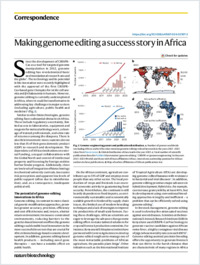Making genome editing a success story in Africa
DOKPE
- Abkallo, Hussein International Livestock Research Institute (ILRI), Nairobi, Kenya
- Arbuthnot, Patrick University of the Witwatersrand, Johannesburg, South Africa
- Auer, Thomas ORCID University of Fribourg
- Berger, Dave University of Pretoria, South Africa
- Burger, Johan Stellenbosch University, South Africa
- Chakauya, Ereck North-West University, Mmabatho, South Africa
- Concordet, Jean-Paul U1154 INSERM, Muséum National d'Histoire Naturelle, Paris
- Diabate, Abdoulaye Institut de recherche en sciences de la santé (IRSS), Bobo Dioulasso, Burkina Faso
- Di Donato, Vincenzo ZeClinics SL. Sant Feliu de Llobregat, Barcelona
- Groenewald, Jan-Hendrik Biosafety South Africa
- Guindo, Amadou African Center for Excellence in Molecular Engineering, Mali
- Koekemoer, Lizette University of the Witwatersrand, Johannesburg, South Africa
- Nazare, Florence African Union Development Agency - NEPAD, Midrand, South Africa
- Nolan, Tony Liverpool School of Tropical Medicine, Liverpool, UK
- Okumu, Fredros Ifakara Health Institute, Ifakara, Tanzania
- Orefuwa, Emma Pan-African Mosquito Association, (PAMCA), KEMRI Headquarters, Nairobi, Kenya
- Paemka, Lily University of Ghana
- Prieto-Godino, Lucia The Francis Crick Institute, London, UK
- Runo, Steven Kenyatta University, Nairobi, Kenya
- Sadler, Marie Swiss Institute of Bioinformatics, Switzerland
- Tesfaye, Kassahun Addis Ababa University, Ethiopia
- Tripathi, Leena International Institute of Tropical Agriculture (IITA), Nairobi, Kenya
- Wondji, Charles Liverpool School of Tropical Medicine, Liverpool, UK
- 2024
Published in:
- Nature Biotechnology. - Springer Science and Business Media LLC. - 2024, vol. 42, no. 4, p. 551-554
English
Since the development of CRISPR–Cas as a tool for targeted genome manipulation in 2012, genome editing has revolutionized basic and translational research around the globe1. The technology and its potential in bio-innovation were recently highlighted with the approval of the first CRISPR–Cas-based gene therapies for sickle cell anemia and β-thalassemia in humans. However, genome editing is currently underexplored in Africa, where it could be transformative in addressing key challenges in major sectors (including agriculture, public health and medicine).
- Faculty
- Faculté des sciences et de médecine
- Department
- Département de Biologie
- Language
-
- English
- License
-
Rights reserved
- Open access status
- green
- Identifiers
-
- DOI 10.1038/s41587-024-02187-2
- ISSN 1087-0156
- Persistent URL
- https://folia.unifr.ch/unifr/documents/331734
Statistics
Document views: 28
File downloads:
- abkalloetalnatbio2024_0: 75
